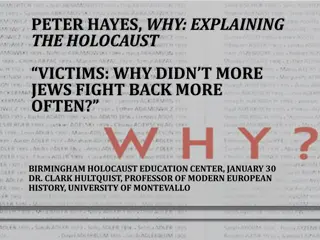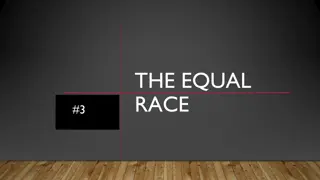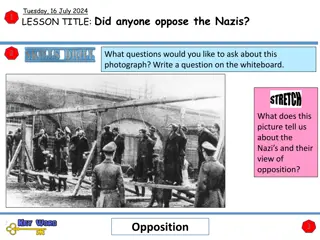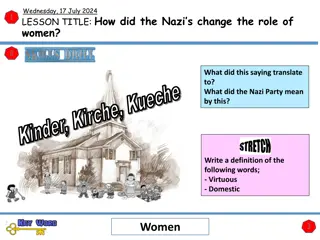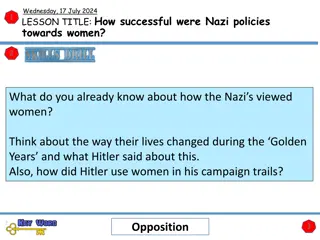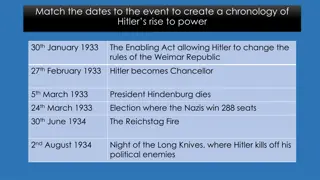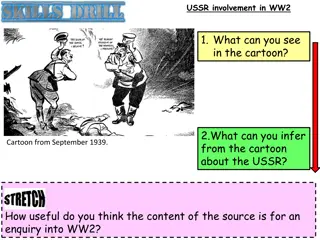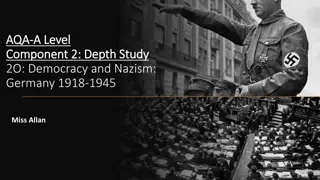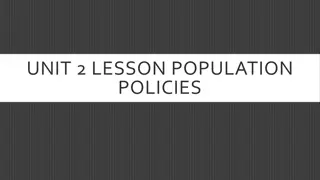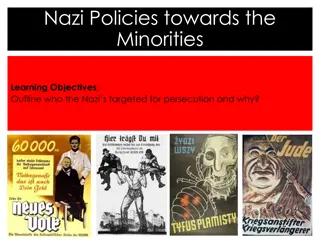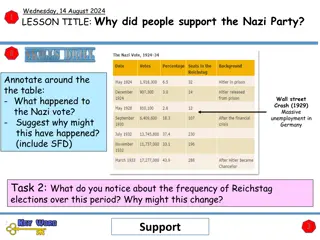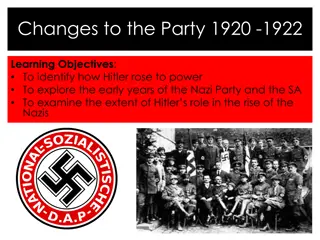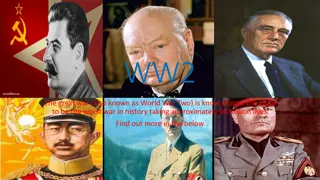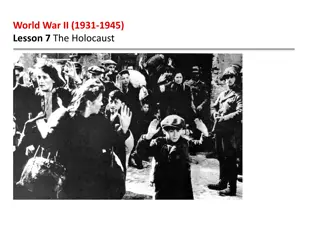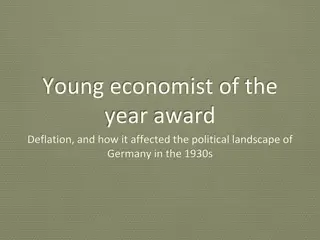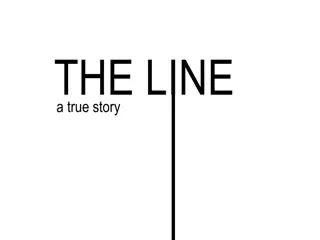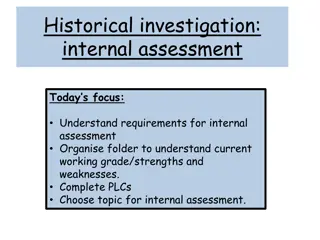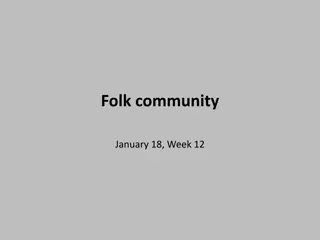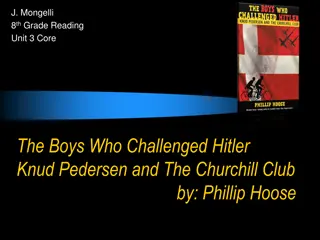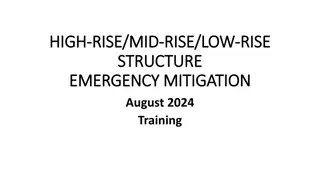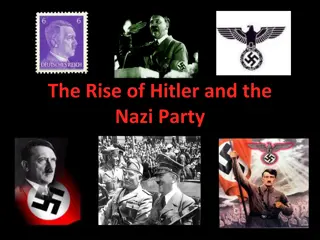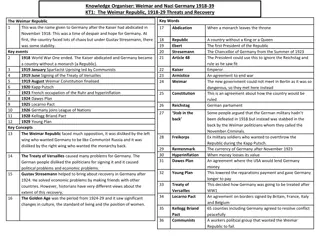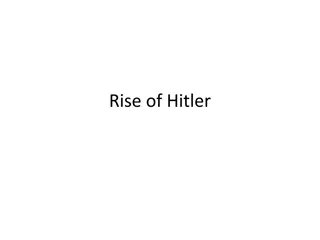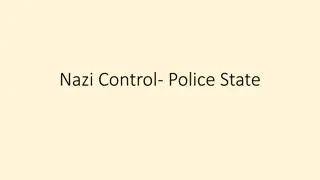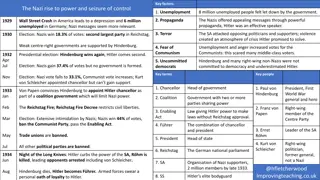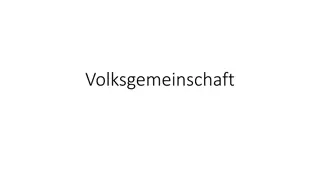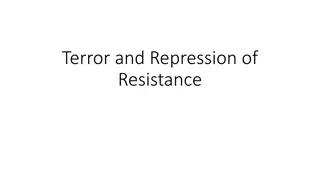Sponsorship Dossier for Club Rise Up: Embracing Kindness
Club Rise Up, a charitable organization focusing on community well-being and personal development, presents a sponsorship dossier to seek support for their Ramadan initiative. The dossier highlights the club's mission, the upcoming Ramadan project, reasons for sponsoring, and benefits for corporate
0 views • 15 slides
World War 2 Key Events and Operations
World War 2, spanning from 1939 to 1945, saw significant events like the invasion of Poland, Operation Barbarossa, D-Day landings, and the conclusion with V-E and V-J Days. Operations such as Dieppe (Operation Jubilee) in 1942 taught crucial lessons in military strategy and coordination. The Atlanti
2 views • 38 slides
Understanding Resistance and Compliance in the Holocaust
Exploring the complex dynamics of why more Jews didn't fight back during the Holocaust, this content delves into the notions of compliance, resistance, and the harsh realities faced by the victims. Through the perspectives of historians such as Raul Hilberg and Yehuda Bauer, it examines the challeng
5 views • 11 slides
International Law of War: Nuremberg Principles and Accountability
The Nuremberg Principles, derived from the trials of Nazi officials for war crimes, establish accountability in international law. These principles hold individuals responsible for committing acts considered crimes under international law, regardless of their position or orders received. The assumpt
2 views • 22 slides
Exploring Symbolism Through Art: Lessons from The Equal Race Mural Project
The presentation outlines "The Equal Race" mural project by Julie Hussey, Alia Oakes, Teagan Tate, and Audrey Thompson, inspired by the Holocaust. It delves into the project's core themes, including hope, despair, and resilience, depicted through a mural featuring a Jewish family, Nazi propaganda, a
1 views • 10 slides
Opposition to Nazis: Youth Groups and Resistance Movements
Explore various forms of opposition to the Nazis through youth groups like the Swing Youth and Edelweiss Pirates. Learn about their defiance against the Nazi regime, including activities and methods of resistance. Discover the diversity of opposition movements and their impact on Nazi Germany's cont
0 views • 10 slides
Women's Role in Nazi Germany: Impact and Ideology
Explore how the Nazis shaped the role of women through policies and propaganda, emphasizing domesticity and motherhood. Analyze key figures like Joseph Goebbels and Hitler's perspectives on women's place in society. Understand the contrast between women's lives in Weimar and Nazi Germany.
0 views • 18 slides
Nazi Policies Towards Women: A Critical Analysis
Nazi policies towards women aimed to control and manipulate their roles in society, focusing on reducing women in the workforce, promoting Aryan reproduction, emphasizing purity and health, and encouraging Aryan marriage. These policies restricted women's freedoms and autonomy, enforcing strict guid
0 views • 11 slides
Poetry and Resistance in French: A Closer Look
Delve into the intersection of poetry and resistance in French literature, exploring how poets like Louis Aragon used their words to oppose Nazi occupation during World War II. Discover the profound impact of poetry in shaping political opinion and inspiring change, as seen through poignant works li
1 views • 11 slides
Retrieval Practice on World War II Events and Concepts
This content provides retrieval practice questions and answers related to World War II events, German occupation, Danish resistance, literature elements, and historical terms. Questions cover topics such as Nazi party rise to power, Jewish resistance, mood in literature, and more. Answers include de
0 views • 11 slides
The Rise of Hitler: Establishing the Nazi Police State in Germany
This content chronicles the key events leading to Hitler's rise to power in Germany, focusing on the establishment of the Nazi Police State through propaganda, surveillance, and punishment. It discusses Hitler's use of violence, propaganda, and speeches to solidify his control. The effectiveness and
0 views • 9 slides
The USSR and Nazi Germany: The Pact of 1939
In the lead-up to WWII, the USSR signed a non-aggression pact with Nazi Germany, shocking the world. This pact included secret clauses dividing Poland and avoiding conflict for ten years. The USSR's alliance with Germany was a strategic move by Stalin due to fear of invasion and perceived weakness o
0 views • 13 slides
Understanding Democracy and Nazism in Germany (1918-1945) - A Level History Depth Study
Delve into the complex history of Germany from 1918 to 1945, focusing on the transition from democracy to Nazism. Explore key events like the rise of the Nazi Party, Hitler's dictatorship, and the impact of World War Two. Challenge preconceived notions of good and evil while enhancing your analytica
1 views • 12 slides
Anne Frank: A Story of Courage and Resilience During World War II
Anne Frank, a German Jewish girl, lived in Amsterdam during World War II. Forced into hiding during the Nazi occupation, she kept a diary that later became a valuable account of Jewish life in Europe. Despite the challenges she faced, Anne's story of hope and perseverance continues to inspire genera
0 views • 10 slides
Analysis of Code Name Verity by Elizabeth Wein: Characters, Plot, and Setting
Delve into the intricate web of characters, plot points, and setting details in Elizabeth Wein's Code Name Verity. Explore the protagonist, Verity, and her best friend Maddie as they navigate espionage amidst the backdrop of World War II. Unravel the complexities of their experiences with the Nazi o
0 views • 11 slides
Ethics in Medical Research: Balancing Patient Care and Knowledge Generation
This content explores the main principles of medical research ethics, the relationship between research and clinical care, and the importance of ethics review committees. It discusses the responsibilities of physicians and researchers, the necessity of staying updated with research, and the conseque
0 views • 40 slides
Understanding Population Policies and Their Impact on Growth Theories
Explore the various government policies - Expansive, Eugenic, and Restrictive - that influence population growth. Discover how these policies encourage or limit natural increase, such as promoting large families or imposing birth control measures. Learn about historical examples like China's one-chi
0 views • 17 slides
Nazi Persecution of Minorities: Targets and Rationale
The Nazis targeted various groups for persecution, believing in a racial hierarchy where certain races were deemed inferior. They aimed to eliminate those they considered undesirable, including Gypsies, black people, the mentally disabled, homosexuals, and more. The Nazis' actions were driven by the
7 views • 12 slides
Understanding the Rise of Nazi Party Support
The lesson explores why people supported the Nazi Party in Germany during the early 20th century. It examines factors such as the Wall Street Crash of 1929 and the Weimar government's failures, leading to the rise of Adolf Hitler and the Nazi party. Students analyze different interpretations of the
0 views • 9 slides
The Rise of Hitler and the Changes in the Nazi Party 1920-1922
Explore how Adolf Hitler ascended to power and examine the significant developments within the Nazi Party between 1920 and 1922, including Hitler's role, the creation of the SA, the 25 Point Programme, Hitler's leadership, and the use of propaganda and violence.
0 views • 13 slides
Insights into World War Two and Adolf Hitler's Role
World War Two started on September 3, 1939, with Britain and France declaring war on Germany. Adolf Hitler's rise to power, initiation of the war, and involvement in the Holocaust are highlighted. The Star of David symbolized Jewish identity under Hitler's rule, and the Holocaust saw six million Eur
0 views • 6 slides
World War Two: A Tragic Account of History's Deadliest Conflict
The content provides a glimpse into the horrors of World War Two, detailing key events such as Adolf Hitler's rise to power, the Dunkirk evacuation, the Blitz bombings, and the Soviet Union's pivotal role in pushing back Nazi Germany. It portrays the devastating impact of the war, capturing the loss
0 views • 8 slides
Understanding the Horrors of the Holocaust in World War II
Explore the dark period of World War II with a focus on the Holocaust, tracing its roots, progression, and impact. Delve into Hitler's campaign against the Jews, his final solution, and the establishment of Nazi death camps. Learn about the devastating consequences of genocide, the United States' re
0 views • 18 slides
Economic Crisis and Political Turmoil in 1930s Germany
Deflation and the Great Depression had a profound impact on Germany in the 1930s, leading to widespread unemployment, economic turmoil, and political unrest. The Weimar Republic faced severe challenges as the Nazi party gained power amidst the economic crisis, exacerbated by the aftermath of World W
0 views • 16 slides
The Rise of Spirit-Empowered King in the Gospel of Isaiah
Celebrating the Servant-Savior in the Gospel of Isaiah by Jason S. DeRouchie explores the rise of the Spirit-empowered King and the delight of the world in Him. The promise of His rise and the impact He brings are highlighted, with a focus on the global salvation through a second exodus orchestrated
0 views • 10 slides
The Line: A Story of Courage and Conscience During World War II
Amidst the dark shadows of Nazi Germany, "The Line" narrates the inspiring tales of individuals like Sophie Scholl and Traudl Junge who dared to stand up against tyranny. It symbolizes the boundary between blind obedience and unwavering integrity, between difficulty and ease, and between conformity
0 views • 22 slides
Requirements for Historical Investigation Internal Assessment
Understand the 25% weightage internal assessment comprising 3 sections for a historical investigation. Focus on source evaluation, investigation, and reflection within a 2,200-word limit. Choose a historical topic, analyze primary and secondary sources, and consider causation, consequence, continuit
0 views • 18 slides
Roman Political History: From Rise of Pompey to Reign of Augustus
In the tumultuous period of Roman history from the rise of Pompey to the reign of Augustus, we witness pivotal events such as the Alliance of the First Triumvirate, the civil war between Pompey and Julius Caesar, Caesar's assassination, the rise of Octavian, and the establishment of the Second Trium
0 views • 20 slides
Exploring Nazi Folk Community and Social Dynamics in Germany
In this detailed exploration, you will delve into the intricate social structures of the Nazi folk community in Germany. From the expulsion of individuals to the liberalization of sexuality, the role of women, youth organizations, education system coordination, and foreign relations, you will learn
0 views • 11 slides
The Boys Who Challenged Hitler: Knud Pedersen and The Churchill Club
The book narrates the inspiring true story of Danish teens who formed the Churchill Club to sabotage the German military during Nazi occupation, sparking a Danish resistance movement. Through acts of courage and defiance, these young patriots played a significant role in their country's fight agains
0 views • 23 slides
High-Rise, Mid-Rise, and Low-Rise Emergency Mitigation Guidelines
High-rise, mid-rise, and low-rise structures pose unique challenges in firefighting due to difficulties in access, inadequate resources, construction complexities, and large number of occupants. This document provides guidelines for responding to incidents in such structures, focusing on safety, res
0 views • 7 slides
The Rise of Adolf Hitler and the Nazi Party: A Historical Overview
Adolf Hitler, born in Austria in 1889, faced rejection as a painter before turning to politics. He led the National Socialist German Workers Party (Nazi) and orchestrated the failed Beer Hall Putsch in 1923. Imprisoned briefly, he penned Mein Kampf that propagated Nazi ideology. By 1932, the Nazi Pa
0 views • 15 slides
Weimar and Nazi Germany: A Historical Overview
Germany's tumultuous period from the Weimar Republic to the rise of Hitler's Nazi Party is marked by economic challenges, political unrest, and social transformation. The Weimar Republic faced threats and sought recovery, while Hitler capitalized on the weaknesses of the system to ascend to power in
0 views • 4 slides
The Rise of Hitler in Germany: Events and Impact
Explore the rise of Hitler in Germany through posters, historical events, and critical questions. Understand how Hitler and the Nazi Party evolved, the significance of the Munich Putsch, reasons for Hitler's chancellorship, and the influence of the Depression and threat of Communism.
0 views • 17 slides
The Holocaust: A Comprehensive Overview
The Holocaust was a tragic chapter in history where millions of Jews and other groups were targeted and persecuted by the Nazi regime during World War II. This summary covers key events such as the rise of the Nazi party, establishment of concentration camps, Nuremberg Laws, and the Final Solution.
0 views • 13 slides
Nazi Control in Germany: The Dark Reign of the Police State
The Nazis implemented a strict regime of control in Germany through censorship, propaganda, and the establishment of a powerful police state. They used organizations like the SS, Gestapo, and SD to suppress dissent, monitor the population, and silence opposition. The legal system was manipulated to
0 views • 8 slides
The Nazi Rise to Power and Seizure of Control
The ascent of the Nazi party in Germany was fueled by key factors such as high unemployment, effective propaganda, use of terror tactics, fear of communism, and the inadequacy of the existing democratic leadership. Through a series of events and political maneuvers, Hitler was eventually appointed C
0 views • 5 slides
The Impact of Volksgemeinschaft in Nazi Germany
The concept of Volksgemeinschaft in Nazi Germany aimed to create a racial community of pure Germans while excluding outsiders, especially Jews. It emphasized the Aryan master race, traditional gender roles, and discriminatory policies against minorities. Despite attempts to promote unity and loyalty
0 views • 8 slides
Nazi Control of Germany - Terror and Resistance
Nazi control of Germany under Hitler's regime involved the use of terror, repression, and coercion through agencies like the SS/Gestapo complex. The Gestapo, initially seen as all-powerful, were actually a relatively small force that relied on denunciations from German citizens. The regime instilled
0 views • 31 slides
Overview of Nazi Propaganda and Control Methods
The content discusses different types of Nazi propaganda, the reasons behind Kristallnacht, and the effectiveness of terror as a control method by the Nazis. It highlights how propaganda, violence, and fear were utilized to manipulate and suppress the German population during the Nazi regime.
0 views • 8 slides


